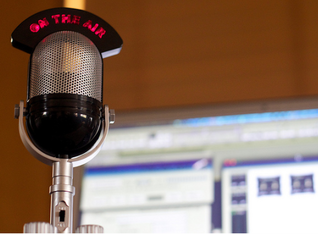
You only have to flick through a few radio stations to hear the dominant voice is male. Every Sony award ceremony women are notable by their presence on stage only being to present gongs to Chris Moyles (ok not just Moyles, we all exaggerate). Only last year the imbalance in radio was highlighted by Ceri Thomas’s insistence there were not yet enough experienced female journalists with a skin thick enough to take on the mantle of a Today presenter. Fine Ceri, but if that’s the case why not go up the age and experience scale and draft P.D James in.
What is surprising is that only as of tomorrow will women in radio have their own organisation, Sound Women. The organisation aims to provide women with mentors who will guide them and hopefully help them to advance their careers in radio, be it in production, editing or tech. It will also, of course, champion those women already in radio and stress the current statistics for women working in radio.
I, for one, certainly prick up my ears when I hear a woman’s name mentioned on BBC Radio 4 as they credit the editors and producer. Here’s why, the percentage of female editors on the radio? 1%. What’s the percentage of studio operators who are female? 10%. Just 2% of BBC local radio breakfast show solo presenters are female and that 2% is one female breakfast presenter in Milton Keynes.
Sound Women have gathered together an impressive list of women in radio to participate in and promote the organisation such as Lauren Laverne, Zoe Ball, Annie Nightingale, Fi Glover and thick skinned Today programme presenter Sarah Montague,
“The Today programme has a healthy mix of men and women behind the scenes, but when you listen, you don't always hear that. Today recognises that as a problem. Sound Women is clearly an organisation that is trying to help work through such dilemmas.”
The organisation was started by Maria Williams, who has worked in radio for over 2 decades, counting deputy editor of Women’s Hour and creating Saturday Live amongst her radio CV highlights. Exasperated by the reasons proffered regarding the dearth of women in radio; no women apply, women aren’t as advanced (interestingly the opposite is true, 73% have degrees, compared to 60% of men) and women are too shrill, Williams decided the time was ripe for Sound Women.
Sound Women hope to emulate the Orange Prize for Fiction and have their own award ceremony for women who excel in radio. These radio statistics look anachronistic; I hope Sound Women is going to change them very soon. We are women, hear us roar. And while we’re at it let us edit, produce and do the tech on that roar.
Kate
I, for one, certainly prick up my ears when I hear a woman’s name mentioned on BBC Radio 4 as they credit the editors and producer. Here’s why, the percentage of female editors on the radio? 1%. What’s the percentage of studio operators who are female? 10%. Just 2% of BBC local radio breakfast show solo presenters are female and that 2% is one female breakfast presenter in Milton Keynes.
Sound Women have gathered together an impressive list of women in radio to participate in and promote the organisation such as Lauren Laverne, Zoe Ball, Annie Nightingale, Fi Glover and thick skinned Today programme presenter Sarah Montague,
“The Today programme has a healthy mix of men and women behind the scenes, but when you listen, you don't always hear that. Today recognises that as a problem. Sound Women is clearly an organisation that is trying to help work through such dilemmas.”
The organisation was started by Maria Williams, who has worked in radio for over 2 decades, counting deputy editor of Women’s Hour and creating Saturday Live amongst her radio CV highlights. Exasperated by the reasons proffered regarding the dearth of women in radio; no women apply, women aren’t as advanced (interestingly the opposite is true, 73% have degrees, compared to 60% of men) and women are too shrill, Williams decided the time was ripe for Sound Women.
Sound Women hope to emulate the Orange Prize for Fiction and have their own award ceremony for women who excel in radio. These radio statistics look anachronistic; I hope Sound Women is going to change them very soon. We are women, hear us roar. And while we’re at it let us edit, produce and do the tech on that roar.
Kate
 RSS Feed
RSS Feed
